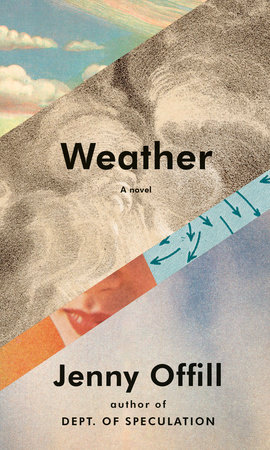Book Review: “Weather” — Despite All the Ruckus
By Drew Hart
There’s a funny, parabolic quality to the emotional weather in Weather — amidst all the unsettling harbingers, the sensation of being in end times, there is still love.
Weather by Jenny Offill. Knopf, 201 pp.

No one I know — you? — is going to say that things aren’t drastically different from the way they were six years ago. That was when Dept. of Speculation, Jenny Offill’s last novel, was published, to considerable acclaim. Now she has returned with Weather. While in some respects it may resemble its predecessor, there are important distinctions to note about this effort, and just as important, to observe about her craft and acumen, that here have climbed to a new level you might think of as a breakthrough.
Dept. of Speculation and Weather both trade in similar stylistic techniques — the use of short, crisp segments; insertions of references from all over; aphorisms; jokes; question-and-answer items. However, this latest outing employs the material toward a larger and more compelling purpose: to illustrate the uncertainty of the present time, and to ask whether or not this is life being lived at the end of everything. Or, if not the actual end, something approaching it? Wondering over this from the very first page — “There are stages and she is in the second to last she thinks” — the story rarely fails to look over its own shoulder, detecting “Something in the distance, limping towards the trees.” The focus is pulled into sharp relief gradually; for the first 50 pages, our narrator’s name is unknown (unless you spot it in the flap copy). Likewise, it’s unclear where we are — it turns out to be Brooklyn — or whether we are in the current moment, or somewhere a little ways ahead. While we’re waiting for the answers, there’s an endless supply of striking writing, mostly in the clipped, edgy fashion mentioned above.
It turns out to be a bright, middle-aged woman — Lizzie — who is telling what goes on here; she’s a failed doctoral candidate who is underemployed as a help desk clerk in a university library. Similarly, her husband Ben, highly educated too, has settled for a career as a coder. While both seem to have accepted less in work status, they live in a generally quiet happiness, in an apartment with their young son. Lizzie has a mentor, Sylvia, who was once her professor and now has become a “Ted Talk”-like celebrity and podcast personality; she employs Lizzie to reply to her fan base’s questions, sometimes taking her on speaking tours. Meanwhile Lizzie also deals with her brother Henry, a quirky substance abuser, trying to keep his boat afloat. There are a multitude of minor voices: the taxi driver who is losing business to the ride-sharing industry; the nosy right-wing neighbor who objects to the New York Times at Lizzie’s door; the collection of displaced patrons who populate her library.
Things develop eventually: the Trump victory is observed (and then we know where we are!); Sylvia retires from her work, citing an urge to hide from the world; Henry messes up again and lands on Lizzie’s sofa, causing stress in her marriage that leads her husband to go away on vacation alone. For a little bit, it looks like Lizzie may take up a lover, an international journalist she keeps encountering out and about, first randomly, then by arrangement; he too retreats from life, into the Quebec woods, and this is before anything serious materializes between them. So — an ongoing succession of lost and disillusioned souls file through; unsurprisingly this feeds a dread in Lizzie herself. She starts researching survivalist techniques, studying the works of ancient monks and hermits, talking about creating a “doomstead.” Through her we learn how to make a candle using a can of tuna fish (must be packed in oil!), and how to capture minnows for supper using a shirttail and … spit.
But there’s a funny, parabolic quality to the emotional weather in Weather — amidst all the unsettling harbingers, the sensation of being in end times, there is still love. Lizzie is still reading Go Dog Go and Narnia tales to her son, attending church with her elderly mother, getting her teeth fixed (if reluctantly). As she says when her journalist friend leaves for Canada, “All these people. I have so many people, you wouldn’t believe it.” At the end of her tale — which might go on forever if Offill kept feeding it with colorful material, and there’s little doubt that she could — it seems that for all the apprehension about the future, things just may keep going on as ever. And despite all the ruckus, that may be what really matters. Call this book a tour de force, with true justification — but its message is just as much about the everyday essence of life as any coming storm.
Drew Hart is from Santa Barbara, California.
